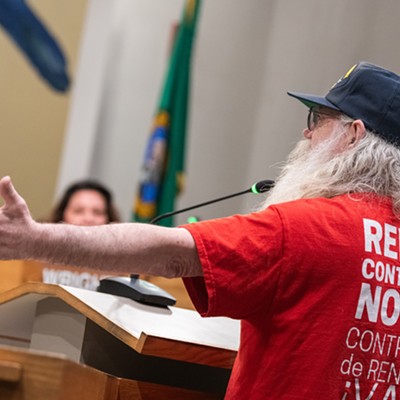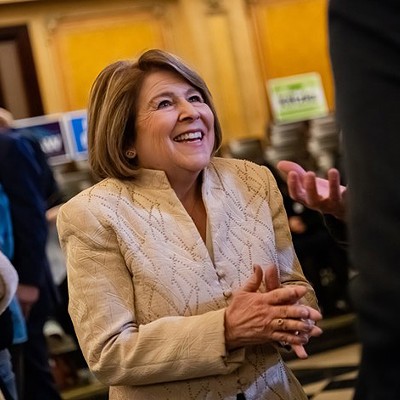Indie Invasion
[
{
"name": "Broadstreet - Instory",
"component": "25846487",
"insertPoint": "4",
"requiredCountToDisplay": "4"
},{
"name": "Broadstreet - Empower Local",
"component": "27852456",
"insertPoint": "8",
"requiredCountToDisplay": "8"
},{
"name": "Broadstreet - Instory",
"component": "25846487",
"insertPoint": "12",
"requiredCountToDisplay": "12"
},{
"name": "Broadstreet - Instory - 728x90 / 970x250",
"component": "27852677",
"insertPoint": "18",
"requiredCountToDisplay": "18"
},{
"name": "Broadstreet - Instory",
"component": "25846487",
"insertPoint": "5th",
"startingPoint": "23",
"requiredCountToDisplay": "24",
"maxInsertions": 100
}
]
by Marty Demarest
The Sundance Film Festival just ended, but don't worry if you missed it; it will be coming to a multiplex near you sometime this year. What was once a hotbed of unknown talent has rapidly become another limelight in which name-brand celebrities can bask, talking of "artistic integrity" while they peddle their discount-made wares to the highest bidder in Hollywood. Because once Tinseltown discovered that people were willing to pay money to see art films, major festivals like Sundance rapidly became moneymaking opportunities; and entry-level filmmakers were nudged out by established artists capitalizing on the public's love of "independent spirit."
However, a whole new slew of festivals has grown up with the express intention of bringing audiences movies that they can't find at festivals like Sundance. Among that expanding list of truly independent festivals falls the Spokane Northwest International Film Festival (SNIFF). Founded five years ago by the Creative Arts Alliance - one of Spokane's most innovative and fearless arts organizations - and directed each year by film critic Bob Glatzer, the festival has maintained a decisively independent approach from the beginning.
A large reason for this is Glatzer's involvement. Personally screening dozens of films, he makes his selection based on a mix of quality, entertainment value and the appropriateness of a given movie for Spokane's film-going audience. And uniquely among film festivals, Glatzer has limited his range of choices to a specific geographic region -- the northwest United States and western Canada.
The process could be called the auteur style of festival directing, but Glatzer's tastes have proven capacious enough to please most of Spokane's film lovers. His past screenings of American Gypsy, a documentary featuring Spokane's Marks family, and Sherman Alexie's The Business of Fancydancing have filled the Met. And he's delighted smaller audiences by bending genres with slacker/screwball capers (Stuff), and genders with lesbian romantic comedies (Better Than Chocolate).
This year's festival looks to be no different in its variety of choices. From the opening film this Friday evening to Sunday night's conclusion, SNIFF will be presenting 11 movies, ranging from a few minutes long to feature-length and differing in scope from comedic documentaries to heartbreakingly real dramas. The directors hail from places like Springfield, Ore., and Calgary and the names of some of the faces onscreen range from the obscure (an unknown aspiring fashion model), to the familiar (David Lynch). Festival-goers can choose to purchase a package for the entire festival ($40), or buy tickets only for the screenings they wish to attend ($7 each).
The opening film is a perfect example of Glatzer's dedication to finding incredible movies that have somehow escaped wide attention. Director Nicholas Racz's The Burial Society, which will be receiving its United States premiere at the festival, is a comedy that captures viewers at the beginning with a dorky accountant's escape from the mafia, and follows him through a series of revelations and plot twists as he tries to find safety in a small-town synagogue. The surprises are doled out with gleeful assuredness, and Rob LaBelle, in the main role, takes Racz's script to hilarious heights. As a final rare treat, both the director and the star will be on-hand to answer audience questions at the Met and celebrate the festival's opening at the Lusso after the screening.
The next afternoon brings a name back to the festival that audiences from previous years may remember: James Dunnison, whose feature Stuff and short film Organ Music were audience favorites in past years. This time Dunnison will be on hand to present two short documentaries, Celluloid Dreams and Pretty Boys.
"I was actually developing two features at the time," Dunnison says, "when these projects came to me from out of the blue. Neither idea was mine, but I had tons of creative input."
Celluloid Dreams features conversations with five critically acclaimed independent filmmakers: David Lynch (Mulholland Drive, Blue Velvet), Guy Maddin (The Heart of the World, Dracula), Jean-Pierre Jeunet (Amelie), and the Brothers Quay (Institute Benjamenta, the hospital sequence in Frida). Far from being a pure interview feature, however, Dunnison intercuts the conversations so that they overlap as they address topics such as dreams and the abstract creative process, and become subtly humorous as the filmmakers try to express themselves in easy terms.
"These are people defined principally by their courage," Dunnison says. "They just say, 'This thing bothers me. I don't know why, but I want to share that with an audience.' It's a vote of confidence for the creative mind."
Pretty Boys is another documentary that allows the audience to both laugh at and learn from its subject -- male models. Following some inflated egos and some humble dreamers, Dunnison brilliantly captures a world rarely glimpsed on film. As he says, laughing, "the fun is that it turns out that it's a bunch of fairly articulate skater kids hanging about in Milan trying to scrape together enough money to pay for the trip. They just happen to look fabulous when they're photographed."
Later that afternoon, The Flats takes viewers to the Skagit Valley for an unconventional tale of relationships and friendship that the Seattle International Film Festival called "a striking feature directorial debut." And that evening, Spokane audiences can catch up with director Gary Burns, whose feature The Kitchen Party delighted audiences several years ago. This year, his feature Waydowntown satirizes both office life and urban development as it follows a group of friends betting on who can stay the longest inside a downtown office mall. "It's a film about people," Burns says, "and architecture, and bad air."
Outpatient is Sunday's first matinee, and it will give audiences a chance to witness the astonishing visual quality that digital video can have when it's used by a sensitive cinematographer and director. Capturing the way that cinema can blend fantasy with photo-realism, the film tells the story of a novelist undergoing psychiatric treatment as he puts his fantasies into his newest book.
Instead of one film at four o'clock on Sunday, Glatzer has programmed four short films. Occasionally festivals will show a short before each feature-length screening, with the unfortunate result that many festivalgoers who attend only a few screenings miss some of the better short works. At this year's festival, however, Glatzer offers a full meal of appetizers, ranging from a 12-minute fable of a couple's discovery at a yard sale of a magical bed, to a short comedy about a lesbian couple who attempt to have a baby with the gay brother of one of them as the sperm donor.
A more substantial film concludes the festival that evening: Marlin Darrah's Monsoon Wife. Set and filmed in Cambodia, the story that Darrah explores universal concepts of love and desire while revealing the alarming underbelly of Phnom Penh's sex industry.
"Cambodia to me represents tragic beauty," Darrah says of his decision to set his fictional story in such an extreme real-world situation. "I love that part of the world -- the people, the Buddhist culture, the geography. But when I was there shooting an educational show, I'd go to bars at night and see the dregs of people. And you can't help but listen to these guys -- their opinions are so forceful. So I started writing it down."
The resulting film -- which was shot, sometimes covertly, on location -- is both culturally enlightening and emotionally complex.
The Sundance Film Festival just ended, but don't worry if you missed it; it will be coming to a multiplex near you sometime this year. What was once a hotbed of unknown talent has rapidly become another limelight in which name-brand celebrities can bask, talking of "artistic integrity" while they peddle their discount-made wares to the highest bidder in Hollywood. Because once Tinseltown discovered that people were willing to pay money to see art films, major festivals like Sundance rapidly became moneymaking opportunities; and entry-level filmmakers were nudged out by established artists capitalizing on the public's love of "independent spirit."
However, a whole new slew of festivals has grown up with the express intention of bringing audiences movies that they can't find at festivals like Sundance. Among that expanding list of truly independent festivals falls the Spokane Northwest International Film Festival (SNIFF). Founded five years ago by the Creative Arts Alliance - one of Spokane's most innovative and fearless arts organizations - and directed each year by film critic Bob Glatzer, the festival has maintained a decisively independent approach from the beginning.
A large reason for this is Glatzer's involvement. Personally screening dozens of films, he makes his selection based on a mix of quality, entertainment value and the appropriateness of a given movie for Spokane's film-going audience. And uniquely among film festivals, Glatzer has limited his range of choices to a specific geographic region -- the northwest United States and western Canada.
The process could be called the auteur style of festival directing, but Glatzer's tastes have proven capacious enough to please most of Spokane's film lovers. His past screenings of American Gypsy, a documentary featuring Spokane's Marks family, and Sherman Alexie's The Business of Fancydancing have filled the Met. And he's delighted smaller audiences by bending genres with slacker/screwball capers (Stuff), and genders with lesbian romantic comedies (Better Than Chocolate).
This year's festival looks to be no different in its variety of choices. From the opening film this Friday evening to Sunday night's conclusion, SNIFF will be presenting 11 movies, ranging from a few minutes long to feature-length and differing in scope from comedic documentaries to heartbreakingly real dramas. The directors hail from places like Springfield, Ore., and Calgary and the names of some of the faces onscreen range from the obscure (an unknown aspiring fashion model), to the familiar (David Lynch). Festival-goers can choose to purchase a package for the entire festival ($40), or buy tickets only for the screenings they wish to attend ($7 each).
The opening film is a perfect example of Glatzer's dedication to finding incredible movies that have somehow escaped wide attention. Director Nicholas Racz's The Burial Society, which will be receiving its United States premiere at the festival, is a comedy that captures viewers at the beginning with a dorky accountant's escape from the mafia, and follows him through a series of revelations and plot twists as he tries to find safety in a small-town synagogue. The surprises are doled out with gleeful assuredness, and Rob LaBelle, in the main role, takes Racz's script to hilarious heights. As a final rare treat, both the director and the star will be on-hand to answer audience questions at the Met and celebrate the festival's opening at the Lusso after the screening.
The next afternoon brings a name back to the festival that audiences from previous years may remember: James Dunnison, whose feature Stuff and short film Organ Music were audience favorites in past years. This time Dunnison will be on hand to present two short documentaries, Celluloid Dreams and Pretty Boys.
"I was actually developing two features at the time," Dunnison says, "when these projects came to me from out of the blue. Neither idea was mine, but I had tons of creative input."
Celluloid Dreams features conversations with five critically acclaimed independent filmmakers: David Lynch (Mulholland Drive, Blue Velvet), Guy Maddin (The Heart of the World, Dracula), Jean-Pierre Jeunet (Amelie), and the Brothers Quay (Institute Benjamenta, the hospital sequence in Frida). Far from being a pure interview feature, however, Dunnison intercuts the conversations so that they overlap as they address topics such as dreams and the abstract creative process, and become subtly humorous as the filmmakers try to express themselves in easy terms.
"These are people defined principally by their courage," Dunnison says. "They just say, 'This thing bothers me. I don't know why, but I want to share that with an audience.' It's a vote of confidence for the creative mind."
Pretty Boys is another documentary that allows the audience to both laugh at and learn from its subject -- male models. Following some inflated egos and some humble dreamers, Dunnison brilliantly captures a world rarely glimpsed on film. As he says, laughing, "the fun is that it turns out that it's a bunch of fairly articulate skater kids hanging about in Milan trying to scrape together enough money to pay for the trip. They just happen to look fabulous when they're photographed."
Later that afternoon, The Flats takes viewers to the Skagit Valley for an unconventional tale of relationships and friendship that the Seattle International Film Festival called "a striking feature directorial debut." And that evening, Spokane audiences can catch up with director Gary Burns, whose feature The Kitchen Party delighted audiences several years ago. This year, his feature Waydowntown satirizes both office life and urban development as it follows a group of friends betting on who can stay the longest inside a downtown office mall. "It's a film about people," Burns says, "and architecture, and bad air."
Outpatient is Sunday's first matinee, and it will give audiences a chance to witness the astonishing visual quality that digital video can have when it's used by a sensitive cinematographer and director. Capturing the way that cinema can blend fantasy with photo-realism, the film tells the story of a novelist undergoing psychiatric treatment as he puts his fantasies into his newest book.
Instead of one film at four o'clock on Sunday, Glatzer has programmed four short films. Occasionally festivals will show a short before each feature-length screening, with the unfortunate result that many festivalgoers who attend only a few screenings miss some of the better short works. At this year's festival, however, Glatzer offers a full meal of appetizers, ranging from a 12-minute fable of a couple's discovery at a yard sale of a magical bed, to a short comedy about a lesbian couple who attempt to have a baby with the gay brother of one of them as the sperm donor.
A more substantial film concludes the festival that evening: Marlin Darrah's Monsoon Wife. Set and filmed in Cambodia, the story that Darrah explores universal concepts of love and desire while revealing the alarming underbelly of Phnom Penh's sex industry.
"Cambodia to me represents tragic beauty," Darrah says of his decision to set his fictional story in such an extreme real-world situation. "I love that part of the world -- the people, the Buddhist culture, the geography. But when I was there shooting an educational show, I'd go to bars at night and see the dregs of people. And you can't help but listen to these guys -- their opinions are so forceful. So I started writing it down."
The resulting film -- which was shot, sometimes covertly, on location -- is both culturally enlightening and emotionally complex.
















